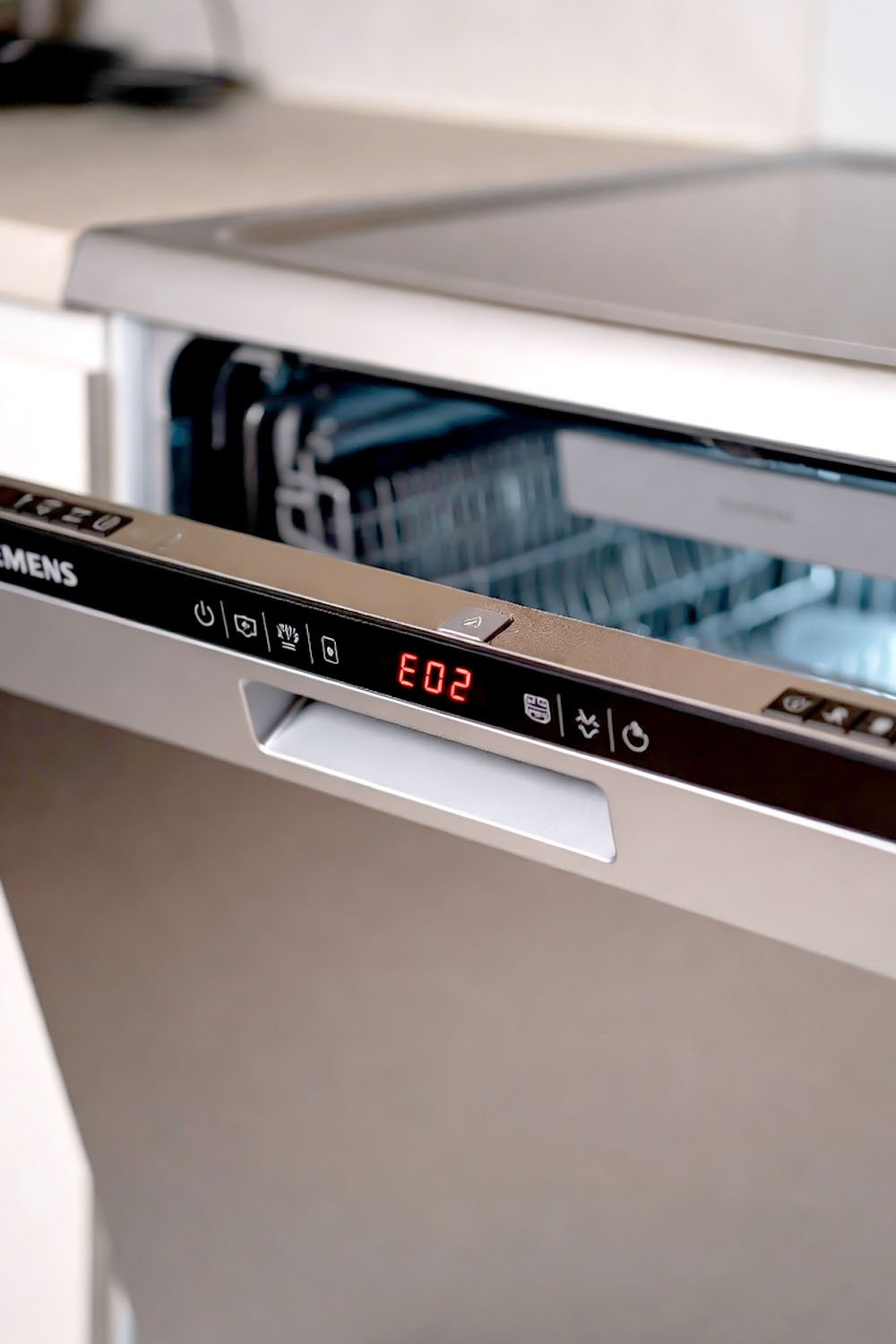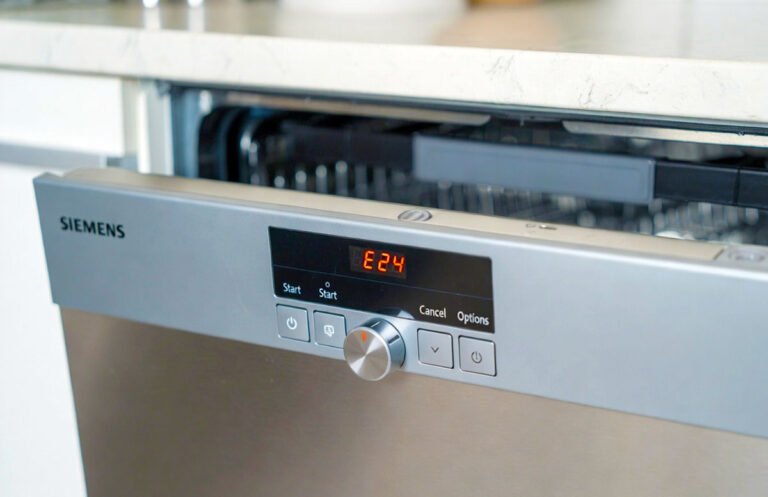As an Amazon Associate, I earn from qualifying purchases at no extra cost to you.
Bosch Dishwasher Sanitize Light Flashing: Fix It Fast
The dishwasher just finished a loud cycle, but the sanitize light keeps blinking. Not a calm sight, right? It’s almost like the machine is trying to tell you something, but in its own secret language. Maybe you wonder if it’s broken or if you did something wrong. In this article, we’ll dive into why the Bosch dishwasher’s sanitize light flashing happens and how you can handle it step by step in the simplest way.
Understand Why the Sanitize Light Flashes
The sanitize light flashing on a Bosch dishwasher often means the cycle did not complete the sanitize part. This is not always a fault. Sometimes it just points to small issues. The machine checks water heat, time, and sensor signals. If one of these fails, the light will blink. It is like a small warning that something was not perfect.
For example, the dishwasher must reach a set high temperature for sanitizing. If the water did not heat enough, the sanitize light will not stay solid. Instead, it flashes to alert you. This often happens when the water heater in the dishwasher or your home’s hot water is not strong enough. So, the machine reports that dishes might not be fully sanitized.
Another reason is when the cycle gets interrupted. If the door was opened during the sanitize phase, the light will start blinking. This is the machine’s way of saying the sanitize part was broken. A power cut or pressing the wrong button can also cause this. So, the light is more like a signal, not always a sign of big damage.
- The flashing light means sanitize did not finish.
- It checks heat, time, and sensors.
- Low water heat is a common cause.
- Interruptions or door opening can also trigger it.
- The machine is warning, not always failing.
Check the Water Temperature First
The sanitize cycle in a Bosch dishwasher depends on hot water. The machine needs water at least 120°F (49°C). If the water is not hot enough, it cannot sanitize. The dishwasher uses sensors to check the temperature. If the water is below the needed heat, the light starts flashing. So, the very first thing you should do is check your water heat.
Go to your kitchen sink and run the hot tap. Let it run for one minute. Then place a thermometer under it to check the temperature. If it is below 120°F, that means your water heater might need adjusting. Dishwashers use the home’s hot water supply at the start. So, if it begins with cold or lukewarm water, the sanitize cycle will fail.
If your water heater is set too low, adjust it carefully. Most heaters have a knob or digital setting. Make sure it is not below 120°F but not above 140°F either. Hotter water is dangerous and can burn skin. After setting it, run hot water at the sink for a few seconds before starting the dishwasher. This ensures the machine begins with hot water right away.
Sometimes, buildup in the water heater can block proper heating. In that case, the water feels warm but not enough. Flushing the heater once a year can help. Also, check if other appliances are using hot water at the same time. When someone showers while you run the dishwasher, the heat drops. That too can trigger the flashing light.
- Dishwasher sanitize needs 120°F water.
- Test with a thermometer at the sink.
- Adjust heater if water is too cold.
- Run hot water before starting cycles.
- Avoid other hot water use at the same time.
Inspect the Heating Element and Sensors
If the water in your home is fine, the next thing to check is inside the dishwasher. The heating element is the part that makes water hot during the cycle. It is usually a metal coil at the bottom. If this part is not working, the sanitize light will keep flashing. The sensors also play a big role. They tell the machine if the water is hot enough. If they fail, the machine gets confused.
Over time, the heating element can burn out or get covered in limescale. Hard water causes this often. A weak element means water takes too long to heat. The sanitize light blinks to show this failure. In that case, you might need to replace the heating element. You can test it with a multimeter for continuity. No reading means it is dead.
Sensors like the thermistor or NTC sensor also fail sometimes. They may send wrong signals about water heat. Even when water is hot, the machine thinks it is not. This also makes the sanitize light blink. Replacing sensors is cheaper than a heating element. Many people forget about this small but vital part.
- Heating element heats the water.
- If broken, sanitize cycle fails.
- Sensors check water heat level.
- Limescale can cause heating issues.
- A pro may be needed for part replacement.
Reset and Run the Dishwasher Again
Sometimes the flashing sanitize light is just a small glitch. Electronics can act strange. Resetting the dishwasher can often solve it. Bosch dishwashers have a reset feature. To reset, hold down the start button for about 3 to 5 seconds. You may hear the pump drain out water. Then the machine resets itself. After that, you can try running the sanitize cycle again.
Another way is to unplug the dishwasher from power. Leave it off for about 10 minutes. Then plug it back in and start fresh. This clears the memory of the control board. Many users find this simple method works well. It’s like restarting a computer when it freezes. Most times, the light stops flashing after a reset.
If the problem comes back right away, then it is more than a glitch. In that case, you will need to go deeper. But always try a reset first. It saves time and stress. Also, be sure the door is closed tightly. A half-open door can stop the sanitize cycle. Even a small gap will cancel it and trigger the flashing light.
While restarting, also check for error codes. Bosch dishwashers often display error codes with flashing lights or beeps. These codes point to the exact problem. Look in your manual for the meaning. A reset clears temporary faults, but not hardware damage. So, if it repeats, it is a sign of repair needs.
- Reset clears small glitches.
- Hold start for 3–5 seconds to reset.
- Unplugging works too.
- Check door is closed fully.
- Look for error codes if problem repeats.
Clean Filters, Spray Arms, and Inside Parts
A dirty dishwasher can also cause the sanitize light to flash. When filters or spray arms are clogged, water flow is weak. The heating system cannot work well if water does not move. This stops sanitizing. Cleaning your dishwasher is not just about smell or looks. It affects how the cycle completes. Bosch dishwashers need good water flow for sanitizing.
Start by pulling out the bottom rack. You will see the filter at the bottom center. Turn and lift it out. Rinse under hot water and scrub with a soft brush. If grease is stuck, soak it in warm soapy water. Next, check the spray arms. Food bits can block the small holes. Use a toothpick to clear them. Make sure they spin freely when you put them back.
Wipe down the inside walls too. Grease or soap scum builds up over time. Run an empty cycle with vinegar or a dishwasher cleaner. This clears out hidden buildup. A clean machine not only works better but also smells fresh. Many times, after a good cleaning, the sanitize light issue disappears.
Do not forget the drain area. If food blocks water from draining, cycles fail. The sanitize step may stop in the middle. Cleaning once a month keeps everything smooth. You may also use dishwasher salt or rinse aid to help prevent scale. A clean machine always performs better and avoids flashing lights.
- Dirty filters block water flow.
- Spray arms must spin freely.
- Vinegar cycle cleans buildup.
- Check and clean the drain.
- Monthly cleaning prevents many problems.
When to Call for Professional Help
Sometimes, no matter what you do, the sanitize light keeps flashing. At this point, it might not be a simple fix. The control board, heater, or sensors may need replacement. These are not always safe to handle at home. A certified Bosch repair technician has the right tools. They also know how to test and replace parts safely.
Calling for help does not mean you failed. Dishwashers are complex machines with many parts. Some problems are hidden deep inside. Professional help ensures you do not make the issue worse. It also keeps your warranty safe if you still have one. Trying to fix the control board yourself may void it.
When you call a technician, explain the problem clearly. Tell them when the sanitize light started flashing. Mention if you already checked water temperature or cleaned filters. This helps them find the root cause faster. It may save you money on labor time too.
In many cases, the cost of repair is lower than buying a new machine. Bosch dishwashers are built to last. A simple part replacement can give them many more years of service. Do not rush into replacing the whole unit just because of one blinking light. Let an expert check it first.
- Pro help may be needed for sensors or board.
- Safety is important with electric parts.
- Keep your warranty safe.
- Share full details with technician.
- Repair is cheaper than replacement in most cases.
Final Thoughts
The Bosch dishwasher sanitize light flashing may look worrying, but it often has simple causes. From water heat to dirty filters, most problems are easy to fix. By checking step by step, you can often solve it at home. And if not, professional help will handle it. Either way, it does not mean your dishwasher is done for. Stay calm, try these fixes, and your machine will work again soon.
| Problem | Possible Cause | Easy Fix |
|---|---|---|
| Light flashing | Low water temp | Adjust heater, run hot water first |
| Cycle stops | Door open | Close door fully, reset machine |
| No sanitize | Heating element issue | Test or replace part |
| Weak water flow | Dirty filters/spray arms | Clean parts and drain |
| Still flashing | Control board fault | Call technician |
Frequently Asked Questions (FAQs)
Is it safe to use the dishwasher when the sanitize light is flashing?
Yes, it is usually safe to use your Bosch dishwasher even if the sanitize light is flashing. The dishes will still be washed, but they may not be fully sanitized. Sanitizing means killing extra germs with higher heat. When the light flashes, it signals that this part of the cycle did not finish correctly. So, while your dishes are clean for daily use, they may not be fully sanitized for things like baby bottles or medical items.
Is it a sign of a serious problem if the sanitize light keeps flashing?
Not always. Many times, the sanitize light flashes because of small issues like low water temperature, clogged filters, or an open door. These can be fixed quickly. However, if the flashing happens often and does not stop after checking those things, it may point to a bigger issue like a broken heating element or sensor. That would need repair. So, the light is more of a warning sign than proof of serious damage.
Can low water temperature cause the sanitize light to flash?
Yes, low water temperature is one of the most common reasons for the sanitize light to flash. Bosch dishwashers need water at least 120°F to complete the sanitize cycle. If your water heater is set too low, the machine cannot reach this heat. As a result, the sanitize function fails, and the light blinks. Running hot water at the sink before starting the dishwasher often helps because it makes sure the machine begins with hot water right away.
Can I reset the Bosch dishwasher to fix the flashing sanitize light?
Yes, you can reset the dishwasher, and it often works. Hold down the start button for 3 to 5 seconds until you hear draining sounds. That means the machine has reset. Another way is unplugging the dishwasher for about 10 minutes and then plugging it back in. This clears the control board’s memory. After resetting, try running the sanitize cycle again. If the light still flashes, then you may need to check deeper issues like heating or sensors.
Do I need to clean the filters and spray arms to stop the flashing light?
Yes, cleaning is very important. Clogged filters or spray arms block water flow, which affects heating and sanitizing. If water does not move properly, the sanitize cycle cannot work. You should remove the filters, rinse them under hot water, and scrub them gently. Spray arms should be cleared of food bits and allowed to spin freely. Also, wipe the inside walls and run a vinegar cycle. Many times, a good cleaning solves the flashing light issue.
Do I need a technician if the sanitize light keeps flashing after resets?
If the light keeps flashing even after cleaning, checking water temperature, and resetting, then yes, it is best to call a technician. The problem might be with the heating element, control board, or sensors. These are not safe or easy to fix without the right tools. A certified Bosch technician can test and replace the faulty part. This way, you avoid damage, keep your warranty safe, and ensure the dishwasher works properly again.
Is it normal for the sanitize light to blink during the cycle?
Yes, it can be normal during certain moments of the cycle. The sanitize light may blink while the machine is heating water to the right temperature. Once it reaches the heat, the light should stay steady. But if it keeps blinking after the cycle is finished, then that is not normal. It means the sanitize function did not complete. You should then check water temperature, filters, or other causes to fix it.
Can I ignore the sanitize light flashing and still use the dishwasher?
You can ignore it, but it is not the best idea. While your dishes will still be washed, they will not be sanitized. For regular meals, this may be fine. But for baby bottles, cutting boards, or items that touch raw meat, sanitizing is important. Ignoring the light means you lose that safety. Over time, ignoring the signal may also hide a bigger problem in heating or sensors. So, it is better to check and fix it sooner.








